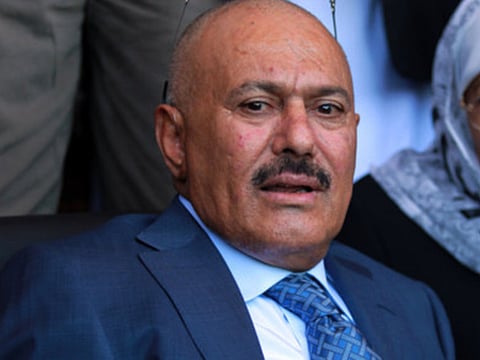Saleh needs support to end ties with Al Houthis
But he still wields power over some army units, militias and tribes

Al Mukalla: The ousted president of Yemen Ali Abdullah Saleh will not break his alliance with the Iran-backed Al Houthis unless he is ready for a long and bloody battle with them, political analysts said.
Saleh’s General People’s Congress recently threatened to review its alliance with Al Houthis following a string of attacks against its supporters in Sana’a, and accusations about Al Houthi domination of top posts.
Analysts believe Saleh will not move to dissolve the alliance until he signs a deal with another force, like the Yemeni government or the Saudi-led coalition. “At the moment, Saleh cannot terminate his alliance with Al Houthis before signing a deal with the Gulf [states] as an alternative to the legitimate government. He is weak and can’t confront Al Houthis on his own,” Abdul Sallam Mohammad, a political analyst and the director of Abbad Centre for Strategic Studies told Gulf News.
Amid growing tensions, Saleh’s party has brought into the public domain an old letter from its secretary-general to Al Houthis, complaining about mistreatment of the party’s journalists and ministers, and Al Houthi reluctance to adhere to previous agreements. At the end of the letter, the party threatened to finish the alliance.
Najeeb Ghallab, a political analyst, said Saleh would first seek an alliance with another force before officially declaring the end of his relationship. “Saleh will only break up with Al Houthis when he is ready to engage in a decisive battle with them,” Ghallab said on his Facebook page. Ghallab added the current tension and brief clashes in Sana’a showed Al Houthis are stronger than Saleh as they swiftly managed to block the capital’s entrances and put Saleh under siege. “Saleh is under siege from the international community, Al Houthis, and the legitimate government. He has no alliances with any countries,” Ghallab told the state TV in a recent interview.
Despite appearing weak during the recent tensions, Saleh still wields power over some army units, militias and tribes, and has grass roots support, Ghallab said. “The Al Houthi-Saleh alliance would not crumble as Saleh’s party is isolated by the legitimate government and the international community. The party has no other option but to throw its weight behind Al Houthis,” Ghallab said.
For the internationally-recognised government, striking a deal with Saleh to revolt against Al Houthis is out of question. The dodgy Saleh cannot be trusted, and he was the driving force behind Al Houthis’ military expansion, analysts said. A military operation in Sana’a is another option.
In the province of Marib, the base of Yemeni army and the Saudi-led coalition, thousands of government troops have amassed in military camps as convoys of modern military equipment arrive from Saudi Arabia. Analysts believe Yemen’s army and the Saudi-led coalition should press ahead with military pressure in Sana’a province instead of waiting for Saleh-Al Houthi front to collapse. Yemeni government forces are battling Al Houthis in Nehim district, almost 40 kilometres from Sana’a airport.
Sign up for the Daily Briefing
Get the latest news and updates straight to your inbox



